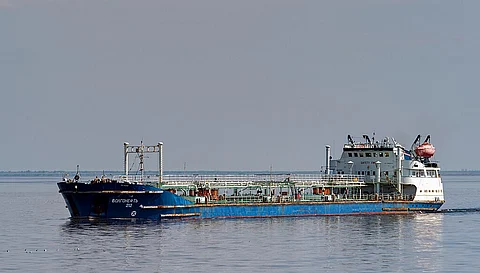

The Black Sea is facing a major environmental threat after two Russian tankers sank into the Kerch Strait on December 15, 2024, spilling thousands of tonnes of fuel oil. The tankers were carrying 9,200 tonnes of fuel oil in total.
The accident marks the latest marine catastrophe near the southern coast of Ukraine, a region already grappling with the effects of war and past ecological crises.
The Kerch Strait, which connects the Black Sea and the Azov Sea, is a key marine ecosystem and a vital route for exports of Russian grain, crude oil, fuel oil and liquefied natural gas.
Both vessels that went down were operated by the Russian company Volgotanker. The Volgoneft-212, a 55-year-old tanker, split in half on December 15, 2024, due to severe weather near the Kerch Strait. Its cargo was low-grade heavy fuel oil, or mazut, destined for the Russian navy.
The second tanker, the Volgoneft-239, was also carrying fuel and was run aground in the same area by strong winds of the storm.
The area experienced a major oil spill in 2007 as well — a severe storm caused the vessel Volgoneft-139 to spill over 1,300 tonnes of oil, the effects of which lingered for years. The incident caused widespread damage to both land and sea, leading to property destruction, contamination of marine and coastal ecosystems, substantial clean-up expenses, and significant revenue losses for local industries.
The Russian Ministry of Civil Defence, Emergencies and Disaster Relief has launched a rescue operation, deploying tugboats, helicopters and more than 50 personnel to rescue crew members. One person aboard the Volgoneft-212 has died, which others have been rescued, reports from Russian state-owned news agency TASS stated.
Russian President Vladimir Putin has ordered a working group to address the crisis and mitigate the spill’s impact, but environmentalists warn that the consequences could be dire.
Ukrainian officials accused Russia of negligence, highlighting the poor condition of the tankers involved in the latest incident, British newspaper The Guardian reported. Dmytro Pletenchuk, Ukraine’s navy spokesperson, criticised Russia’s decision to operate ageing vessels in treacherous conditions, calling the spill a “reckless” act.
Since the Kremlin’s full-scale invasion of Ukraine in February 2022, Russian oil imports have faced heavy sanctions from Ukraine’s allies. In recent years, Russia has been accused of operating a “ghost fleet” of poorly maintained and underinsured tankers to bypass these sanctions. However, according to a BBC News report, the tankers involved in Sunday’s incident do not appear to belong to this fleet.
Global campaigning network Greenpeace has expressed grave concerns about the incident, with Paul Johnston, head of Greenpeace Research Laboratories, describing the spill’s potential impact on marine life and coastal ecosystems.
“If it [the spilled oil] is driven ashore, then it will cause fouling of the shoreline, which will be extremely difficult to clean up,” Johnston said in a statement. The type of oil spilled — heavy residual fuel oil — could cause visible and long-lasting damage to marine habitats, he warned.
The priority, after rescuing the crew, should be to minimise further spillage. If the ships sink, oil and petrochemicals could leak over a longer period, he added.
The Black Sea has already been severely affected by military activities since the 2022 invasion. The sinking of naval vessels, underwater explosions, and pollution from destroyed infrastructure have disrupted marine life.
Scientists have also recorded alarming declines in populations of dolphins, molluscs, and crustaceans due to war-related pollution. The latest spill further compounds these ecological threats.
In June 2023, Russia allegedly destroyed Ukraine’s Nova Kakhovka dam over the Dnipro river, triggering catastrophic flooding. Many analysts believe that Russian forces deliberately destroyed a section of the dam to obstruct Ukraine’s planned counteroffensive, though Russian authorities have denied these claims. The explosion released 18 billion tonnes of water stored upstream in a massive reservoir.